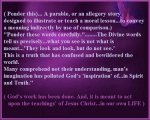I have heard many people and sadly even some Christians state that the bible contradicts itself. However, is this really true? The answer is no and this is the reason.
Acts 1:8 - “But ye shall receive power, after that the Holy Ghost is come upon you: and ye shall be witnesses unto me both in Jerusalem, and in all Judaea, and in Samaria, and unto the uttermost part of the earth.”
Acts 2:32 - “This Jesus hath God raised up, whereof we all are witnesses.”
1 Peter 5:1 – “The elders which are among you I exhort, who am also an elder, and a witness of the sufferings of Christ.”
The bible is written by witnesses. This means that the information is written by the people who saw the events that happened. In court, a witness is regarded as one of the most credible sources of information. It is actually difficult to solve a case without a witness and there is a lot of reliance placed on witnesses.
Now imagine that there was a car accident and you are a police officer at the police station and four witnesses came to testify about what they saw.
The answer is no, you will not conclude that. The witnesses stated what they saw from their perspective. What you will conclude is that there was a car accident which involved a reddish car that had either three or four passengers. You will then investigate further by inspecting the car and going to the hospital where the passengers were taken to.
The reason for the “contradictions” is because the witnesses were stating what they saw from their own standpoint.
The bible is the same way. Let as look at the four gospels Matthew, Mark, Luke and John that talk about the life of Jesus.
They were written by four witnesses. When you read them, some of them have more details than the others about a particular incident and some have missing information. These discrepancies are not contradictions; the witnesses are simply stating what they saw and heard. Because the bible is written by witnesses who do not 100% agree with one another, it does not mean that the bible contradicts itself. Actually the many witnesses are an indication that bible is credible and more reliance can be placed on it. If the witnesses agreed 100% word for word, then it would be suspicious and look like the account of the witnesses was tampered with and that the bible was altered on purpose to remove discrepancies. It is not possible for witnesses to agree exactly on what they saw and heard.
Although the bible looks like it has “contradictions”, although it really does not. What can be concluded from reading the gospels is that there was a man called Jesus. He was the Son of God. He showed love and kindness where ever He went. He died to save us from our sins and resurrected from the dead and physically went to heaven and has promised to come back very soon.
Therefore the focus should be on the main message and not what discrepancies there are between the witnesses.
Acts 1:8 - “But ye shall receive power, after that the Holy Ghost is come upon you: and ye shall be witnesses unto me both in Jerusalem, and in all Judaea, and in Samaria, and unto the uttermost part of the earth.”
Acts 2:32 - “This Jesus hath God raised up, whereof we all are witnesses.”
1 Peter 5:1 – “The elders which are among you I exhort, who am also an elder, and a witness of the sufferings of Christ.”
The bible is written by witnesses. This means that the information is written by the people who saw the events that happened. In court, a witness is regarded as one of the most credible sources of information. It is actually difficult to solve a case without a witness and there is a lot of reliance placed on witnesses.
Now imagine that there was a car accident and you are a police officer at the police station and four witnesses came to testify about what they saw.
- Witness 1 and 2 state that a red car hit a traffic light at an intersection. Witness 3 and 4 state that a maroon car hit a traffic light at an intersection.
- Witness 1 and 2 state that they saw three passengers in the car. Witness 3 states that he saw three adults and a child in the car. Witness 4 states that he saw four adults in the car.
- Witness 1 and 4 state that they saw that one of the wheels was flat. Witness 2 and 3 state that none of the wheels were flat.
The answer is no, you will not conclude that. The witnesses stated what they saw from their perspective. What you will conclude is that there was a car accident which involved a reddish car that had either three or four passengers. You will then investigate further by inspecting the car and going to the hospital where the passengers were taken to.
The reason for the “contradictions” is because the witnesses were stating what they saw from their own standpoint.
- Witness 1 and 2 saw only three adults because they witnessed the scene from the back of the car and the fourth passenger was very short and was sitting in the front of the car and they could not see her.
- Witness 3 and 4 were standing at the front of the car and could see all four passengers. Because the fourth passenger in the front was short, witness 3 assumed that she was a child. However, witness 4 was closer to the vehicle and could see that, it was not a child but a very short lady.
- Witness 1 and 4 saw that one of the wheels on the left side of the car was flat because they were standing on the left side of the car. Witness 2 and 3 were standing on the right side of the car and did not see the flat wheel.
The bible is the same way. Let as look at the four gospels Matthew, Mark, Luke and John that talk about the life of Jesus.
They were written by four witnesses. When you read them, some of them have more details than the others about a particular incident and some have missing information. These discrepancies are not contradictions; the witnesses are simply stating what they saw and heard. Because the bible is written by witnesses who do not 100% agree with one another, it does not mean that the bible contradicts itself. Actually the many witnesses are an indication that bible is credible and more reliance can be placed on it. If the witnesses agreed 100% word for word, then it would be suspicious and look like the account of the witnesses was tampered with and that the bible was altered on purpose to remove discrepancies. It is not possible for witnesses to agree exactly on what they saw and heard.
Although the bible looks like it has “contradictions”, although it really does not. What can be concluded from reading the gospels is that there was a man called Jesus. He was the Son of God. He showed love and kindness where ever He went. He died to save us from our sins and resurrected from the dead and physically went to heaven and has promised to come back very soon.
Therefore the focus should be on the main message and not what discrepancies there are between the witnesses.
-
1
-
1
-
1
-
1
- Show all


